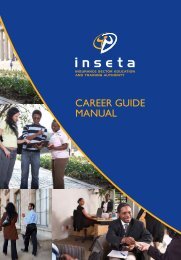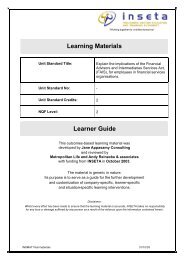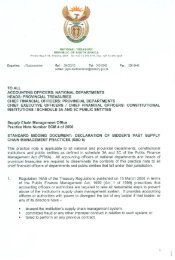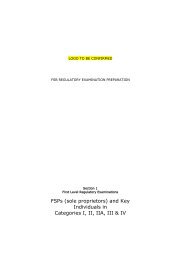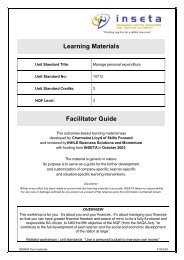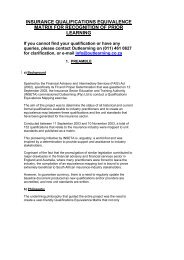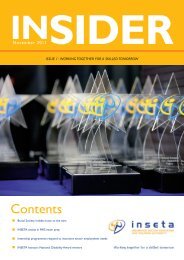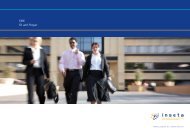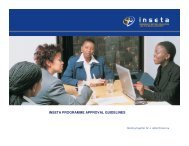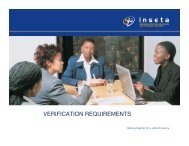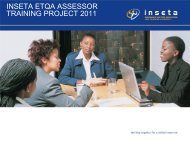SSP Brochure:Layout 1 - INSETA
SSP Brochure:Layout 1 - INSETA
SSP Brochure:Layout 1 - INSETA
Create successful ePaper yourself
Turn your PDF publications into a flip-book with our unique Google optimized e-Paper software.
The FPI has been actively involved in the development of industry-specific qualifications that are now offered at various tertiaryinstitutions. The qualifications and the higher education institutions that offer industry-specific qualifications can be seen in Table 3-5.Table 3.5 Public higher education institutions that offer industry-specific qualificationsUniversity Qualification NQF levelUniversity of Stellenbosch Business School Advanced Diploma in Financial Planning* 5Damelin National Certificate in Wealth Management 5Certificate in Financial Planning 6Intec National Certificate in Wealth Management 5University of Stellenbosch BCom in Financial Planning* 6BCom Honours in Financial Planning 7University of Nelson Mandela Metropole BCom Financial Planning* 6University of the Free State BCom Financial Planning* 6BJuris Financial Planning 6Postgraduate Diploma in Financial Planning* 7Advanced Postgraduate Diploma in Financial Planning* 7University of Johannesburg BCom in Investments 6University of KwaZulu-Natal BCom in Financial Planning* 6University of Pretoria BCom in Financial Planning* 6University of the Witwatersrand BCom in Business Science 6Sources: FPI and <strong>INSETA</strong>.The College of Insurance (CoI) was born out of the Insurance Institute of South Africa (IISA), a professional body that used to provideindustry-specific training. Early in 2005, the IISA separated its education and training activities and transferred them to the newlyestablished CoI, which offered one course at the HET level. The rest of its training was at FET level. In 2006 this College was closeddown and the training provision of the qualifications traditionally offered by the College was taken over by various private trainingproviders who continue to offer training towards insurance related qualifications 53 .b) Graduation trendsThe number of graduates who qualified from the public higher education system in commerce, finance and management sciences hasincreased steadily in recent years. Table 3-6 shows that between 1999 and 2004, the total number of qualifications awarded by publicuniversities increased by 11% a year. The increase in postgraduate diplomas and Honours degrees was higher than that in first degrees,which indicates that people are tending to stay longer in the HET system and that the number of people with postgraduatequalifications is increasing.Table 3.6 Qualifications awarded by universities in business, commerce and management sciences according to qualification level:1999-2004Qualifications 1999 2000 2001 2002 2003 2004 Average annual growthrate (%)*First degrees 5 783 6 589 7 106 8 359 8 649 9 560 11Postgraduate diplomas/Honours degrees 2 878 4 173 4 392 5 214 5 322 5 465 14Master’s degrees 1 159 1 215 1 333 1 592 1 538 1 660 7Doctoral degrees 12 25 23 42 63 63 39Total 9 831 12 001 12 853 15 207 15 572 16 748 11*Unweighted average.Source: Calculated from DoE, HEMIS Table 2.13, 1999 to 2004.Table 3-7 shows the specific fields of study and the increase in the number of qualifications awarded in each of them. The numberof learners 54 who qualified in insurance and risk management is still small, but it increased by 24% a year from 1999 to 2003. The2004 results show a substantial drop in the qualifications awarded in this field of study, which could be because the results of theUniversity of South Africa (UNISA) are only provisional and should still be finalised.Table 3-8 provides an overview of the qualifications in business, commerce and management sciences awarded by universities oftechnology (previously technikons). In the period 1999 to 2004 technikon output increased on average by 9% a year. Most of thequalifications awarded were at the national diploma level. BTech degrees increased by 15% a year.53 Information provided in a personal interview with the acting CEO of the IIA, July 200754 The numbers indicated in the specific fields of study do not necessarily represent the number of individuals who obtained qualifications in that field. In the HEMIS data, a fieldof study is assigned to each major subject the learner passed. If a learner qualified with a major in insurance and risk management and one in accounting, only 0.5 of the learnerwould be counted in each field. The totals in the table, however, more or less add up to the total number of individuals who qualified in the broad field of business commerceand management sciences.<strong>INSETA</strong> Sector Skills Plan - page 26




